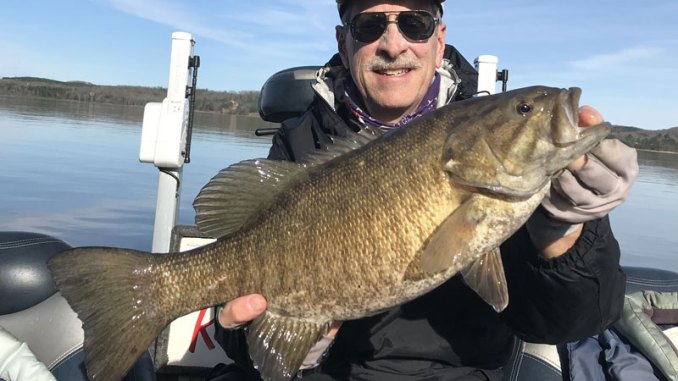
Scientists agree that climate change is the defining issue of this generation. Predicted effects on society and the economy are huge, but it also will have manifold and potentially drastic effects on natural resources that anglers enjoy.
Reservoirs provide the bulk of inland fishing opportunities in Mississippi. A scientific paper by three of the United States’ foremost authorities on reservoir fisheries — Dr. Steve Miranda of the U.S. Geological Survey’s Mississippi Cooperative Fish and Wildlife Research Unit, Giancarlo Coppola, fisheries researcher at Mississippi State University, and Jeff Boxrucker, coordinator of the National Reservoir Fisheries Habitat Partnership — assessed the impacts of predicted climate changes on reservoirs and the fisheries they support. I have extracted from that comprehensive analysis those effects that, in my opinion, are germane to Mississippi reservoirs.
Temperature
Three decades ago “global warming” began to make headlines and get the attention of fisheries scientists. Increases in temperature are, indeed, the driving force of climate changes, but forecast temperature changes alone probably will have little effect on Mississippi’s reservoir fisheries. The forecast increases in summer temperature in the Southeastern U.S. will be relatively small — although be ready for enduring more 95 degree-plus days on the water. However, lengthening of the growing season — earlier warming and later cooling — may affect fisheries. On the positive side, growth rates of sportfish may increase. Unknown, however, will be whether the production of forage will be able to meet the increased food demands of sportfish or will the forage be depleted.
A longer growing season may be help aquatic plants grow. Most are beneficial to fisheries in moderate amounts, but a longer growing season is conducive to the growth of non-native nuisances like hydrilla, Eurasian watermilfoil, giant salvinia and water hyacinth that thrive under warm conditions.
Although maximum water temperatures may change little, winter water temperatures are predicted to warm. Mississippi’s waters will experience fewer shad die-offs, but the new, thermal conditions are conducive to establishment of invasive fishes native to tropical waters.
Stratification
Many of Mississippi’s reservoirs thermally stratify in the summer. The warm, well-oxygenated upper-water layer (the epilimnion) does not mix with the cooler lower-water layer (the hypolimnion) when a lake is stratified. Organisms living in the deeper water, and decomposition of organic matter settling into that water, deplete the oxygen, and the habitat becomes uninhabitable to all organisms except bacteria, fungi and a very few aquatic insect larvae. The production of macroinvertebrates — animals like insect larvae and crayfish — that are vital foods for fishes will decline. Earlier warming and later cooling mean a longer period of stratification and a longer period when a substantial portion of the reservoir is not available to fish and their food organisms.
Plants — algae, phytoplankton and macrophytes — are primary producers, the foundation of the food web that ends in fish. Nutrients necessary for primary production are trapped in deeper water when a lake is stratified. Prolonged stratification means a longer time of when nutrients are unvailable to plants.

Rainfall
Rainfall predictions for the Southeast have substantial uncertainty, partly because the region lies between an increasingly dry Southwest and an increasingly wet northern region and partly because of the effects of hurricanes.
Reservoirs are impounded rivers and have large watersheds. As such, conditions in reservoirs are strongly influenced by activities on the watershed. Mississippi’s soils are generally fertile but also highly erodible. While annual precipitation may increase little, the pattern of more intense precipitation events separated by periods of drought will result in more soil washing into reservoirs, increasing sedimentation and turbidity. Sediment inputs will be further increased when heavy rains occur in the winter when vegetative cover is light and agricultural lands lack soil-stabilizing crops.
Sediment inputs will reduce reservoir lifespan, reduce production of aquatic organisms that are energy pathways to fish, and degrade fish habitat. Turbidity will suppress the growth of aquatic plants. High sediment inputs, coupled with irregular flood-drought cycles, are conducive to sediment deposition that not only fills bays and backwaters but blocks connection to them, a problem plaguing Tenn-Tom Waterway fisheries.
Southeastern reservoirs will largely be spared the drastic de-watering predicted to occur in southwestern reservoirs, but high flows could reduce water residence time — how long it takes to replace the volume of water in a reservoir. The relationship of fish recruitment to reservoir flows remains elusive, but the production of plankton peaks at mid-range residence times in riverine reservoirs.
To be or not to be
While some debate the predictions of global climate change, change is occurring. Glaciers are melting. Hurricane season begins earlier, and storms are more numerous. Precipitation is more erratic but also more dramatic. Some fisheries managers prefer a precautionary approach and are preparing for change.
Miranda, Coppola, and Boxrucker identify ways to sustain productive, desirable fisheries in the uncertain climate future:
- Prevent the introduction of invasive, non-native species;
- Achieve watershed management actions that minimize or ideally, eliminate, sediment and nutrient inputs;
- Maintain, restore and, where necessary, enhance habitat conditions and key habitat types to benefit native fishes and other aquatic plants and animals.
Climate-change predictions vary, and the ecological processes that produce the fish anglers enjoy are complex. What the effects of a changing climate on reservoir fisheries will be and when they will occur is uncertain. What is certain is that habitat loss and changes to fish assemblages cannot be reversed.




Be the first to comment